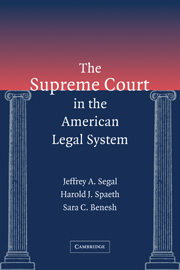7 - State Courts
Published online by Cambridge University Press: 05 June 2012
Summary
Although Election 2000 was surely a federal matter, as evidenced by the federal court involvement therein, the problems started in the state of Florida. The legal battles began there, too, as the following analysis indicates.
On November 8, the day after the election, with every Florida county reporting, Bush held a 1,784-vote lead over Gore. Because of the closeness of the vote, Florida law called for an automatic machine recount, which cut Bush's margin to 229 votes of nearly 6,000,000 cast.
Florida law next allows unsuccessful candidates a chance (1) to “protest” the election before the state's certifying the winner and then a chance (2) to “contest” the election after certification. Thus, although certifying the winner was not the ultimate step in Florida's presidential campaign, the Gore campaign determined that certification of a Bush victory would be a mortal blow to their effort to win the state, and thus the election.
In the protest period, canvassing boards may, at the request of any candidate, authorize 1 percent manual recounts. If those recounts demonstrate an error in the vote tabulation that could affect the outcome, the boards shall correct the tabulation error, verify the tabulation software, or conduct a manual recount.
The problem for Gore was that any such recounts during the protest stage, which mainly envisaged mechanical and tabulation problems, had to be completed within one week of the election, and they were not getting done or likely to be completed in time.
- Type
- Chapter
- Information
- The Supreme Court in the American Legal System , pp. 147 - 186Publisher: Cambridge University PressPrint publication year: 2005



